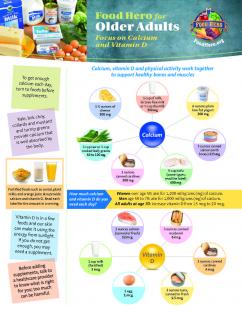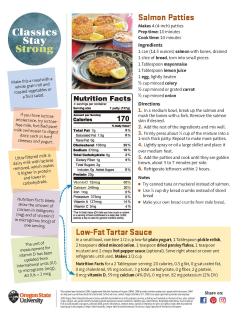Focus on Calcium and Vitamin D
Calcium, vitamin D and physical activity work together to support healthy bones and muscles
Calcium
- 1 ½ ounces of cheese= 300 mg
- 1 cup of milk, lactose-free milk or ⅓ cup dry milk= 300 mg
- 6 ounces plain low-fat yogurt= 300 mg
- 3 ounces canned salmon (with bones)= 225 mg
- ½ cup tofu (some types; read the label)= 400 mg
- 3 ounces canned sardines= 300 mg
- 1 cup raw or ½ cup cooked leafy greens= 60 to 100 mg
How much calcium and vitamin D do you need each day?
Women over age 50: aim for 1,200 milligrams (mg) of calcium.
Men age 50 to 70: aim for 1,000 milligrams (mg) of calcium.
All adults at age 70: increase vitamin D from 15 mcg to 20 mcg.
Vitamin D
- 3 ounces salmon (canned or fresh)= 12 mcg
- 3 ounces canned mackerel= 6 mcg
- 3 ounces canned sardines= 4 mcg
- 3 ounces tuna, canned or fresh= 1.5 mcg
- 1 egg= 1 mcg
- 1 cup milk (fortified)= 3 mcg
More About Calcium and Vitamin D
- To get enough calcium each day, turn to foods before supplements.
- Kale, bok choy, collards and mustard and turnip greens provide calcium that is well absorbed by the body.
- Fortified foods such as cereal, plant milks and orange juice also provide calcium and vitamin D. Read each label for the amount in a serving.
- Vitamin D is in a few foods and our skin can make it using the energy from sunlight. If you do not get enough, you may need a supplement.
- Before adding supplements, talk to a healthcare provider to know what is right for you; too much can be harmful.
Classics Stay Strong
- Make this a meal with a whole grain roll and roasted vegetables or a fruit salad.
- If you have lactose intolerance, try lactose free milk, fortified plant milk and easier-to-digest dairy such as hard cheeses and yogurt.
- Ultra-filtered milk is dairy milk with lactose removed, which makes it higher in protein and lower in carbohydrate.
- Nutrition Facts labels show the amount of calcium in milligrams (mg) and of vitamin D in micrograms (mcg) of one serving.
- The unit of measurement for vitamin D has been updated from international units (IU) to micrograms (mcg). 40 IUs = 1 mcg




